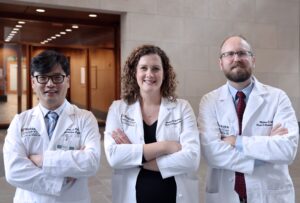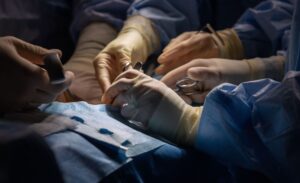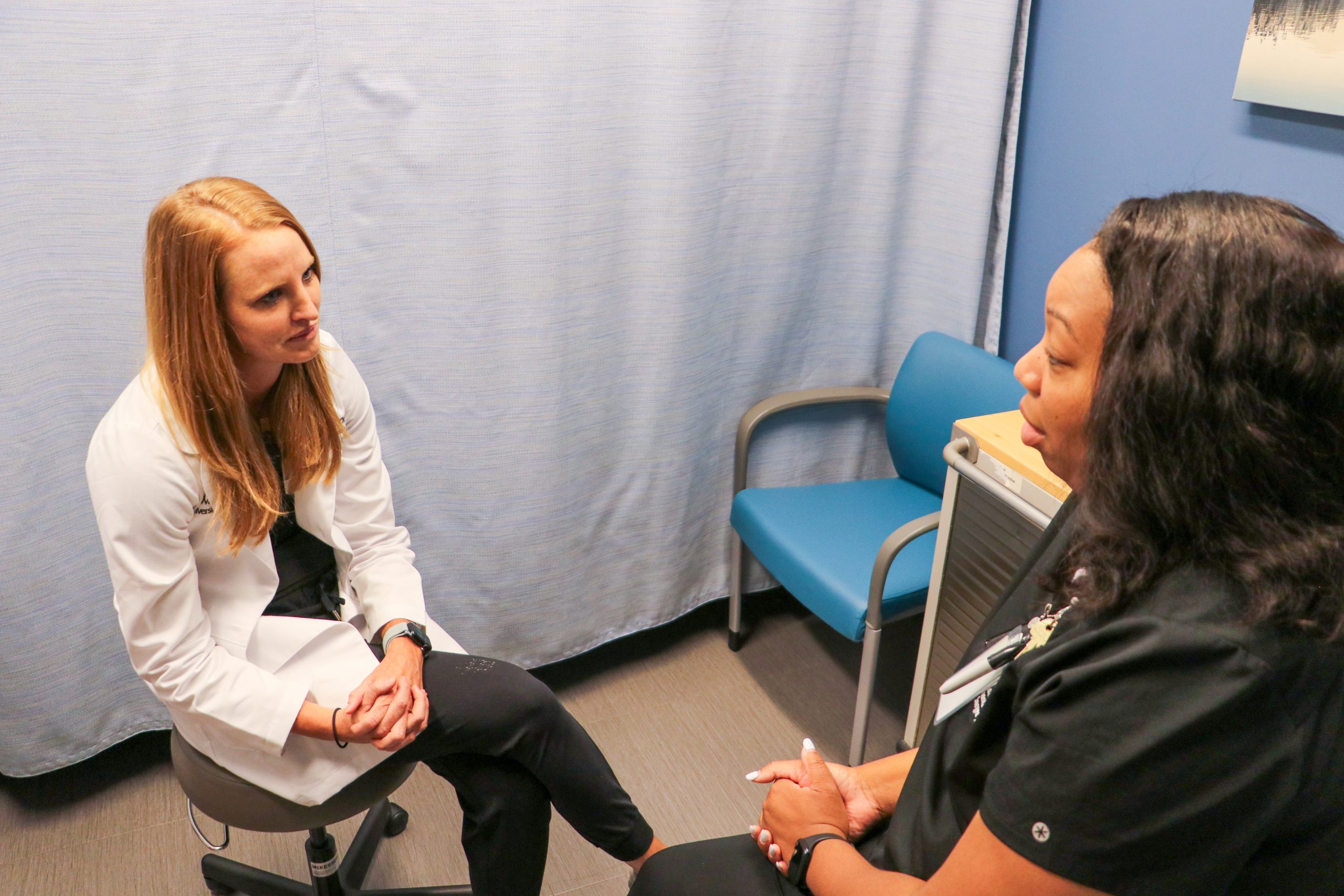Nurse practitioner Carrie Bettlach, FNP, and her team within the Division of Plastic and Reconstructive Surgery now offer cosmetic injectable treatments and consultations at the Center for Advanced Medicine (CAM). At Barnes-Jewish West County Hospital, Plastic and Reconstructive Surgery offers a broad range of specialty cosmetic services including laser treatments, micropeels, facial treatments from estheticians and a wide variety of fillers. By expanding their injectables services to the CAM, the team offers an additional location made especially convenient to employees working on the medical campus.
Cosmetic injectables are neurotoxins injected into the skin to help ease facial aging and wrinkles. Often, a consultation to discuss treatment and the treatment itself can be conducted in the same appointment and administered within minutes, with little need for prep or aftercare on the patient’s end. Recognizing an increasing number of regular patients from the School of Medicine, Bettlach and her team sought to provide this time-efficient service in a more accessible location for employees.
“One thing my staff and faculty patients at the CAM have told me over and over again is about the convenience of being able to do it when they’re already here,” says Bettlach. “Whether it’s at the end of your work day or if you can pop over during your lunch break, you’re already here and parked – you’re not having to leave and drive to a separate appointment. So I think the convenience factor has been a huge thing.”
Injectable neurotoxin treatments are an increasingly popular and low-risk cosmetic treatment most often used to relax wrinkles, contour the face and help diminish other signs of aging. Neurotoxins help block or pause certain muscle movements in the face which cause or worsen facial lines and wrinkles. While the procedure requires injections, Bettlach’s team uses small needles to minimize discomfort and offer numbing prior to injection for apprehensive patients. Little is required of the patient to prepare for the procedure. It is typically recommended not to lie flat for 3-4 hours or raise blood pressure for 24 hours after treatment.
Injectables are not permanent and tend to wear off between 3-6 months on average. In expert hands, these treatments can help patients achieve a natural and more youthful appearance.
“My personal approach is: less is more,” says Bettlach. “If someone has been thinking about it for a while and it’s something they might want to try, I would educate them it can be very subtle and can make you feel more confident about the things that you’re worried about. We start slowly, by injecting only a small amount to see how patients like it. I would much rather have the patient come back and do more than go overboard and have the patient not be satisfied with their results.”
Bettlach, who has been with the division going on ten years this September, started her career as an emergency room nurse before going back to school to earn her NP. In addition to offering injections, she sees adults and children for a variety of upper extremity issues both in conjunction with Plastic and Reconstructive Surgery physicians and independently, as well as daytime consults throughout the medical campus, and works closely with junior residents. Having trained herself under mentors including Assistant Professors Mitchell Pet, MD, and Amy Kells, MD, Professor of Surgery Ida Fox, MD, Minot Packer Fryer Chair of Plastic Surgery Susan Mackinnon, MD, and current Chief of the Division of Plastic and Reconstructive Surgery, Justin Sacks, MD, MBA, Bettlach takes pride in sharing knowledge with the next generation of medical professionals.
At the CAM, Assistant Professor of Surgery Rachel Anolik, MD, oversees injectables, administered by Bettlach and fellow nurse practitioner Meg Costa. At the Barnes-Jewish West County Hospital practice, the injectables team includes physician’s assistant Emily Weinhaus, PA-C, and plastic and reconstructive surgeons Trina Ebersole, MD and Marissa Tenenbaum, MD. The entire team receives support from Division Chief Sacks.
“My favorite thing about WashU is the collaboration,” Bettlach says. “I have the privilege to work with a wide variety of supremely talented people from all different specialties and to take care of patients from all walks of life. I don’t think I can speak enough to amount of support that I have received, not only from Dr. Sacks and Dr. Anolik, but from so many others in the division. The beauty of working in a place like this is that you don’t have to know everything. If you don’t know the answer, chances are that someone else will. I can’t speak highly enough about what it means to have that support.”
Since she began offering injectable services at the CAM, Bettlach has had the opportunity to get to know the community at Washington University, having treated nurses, coordinators, physicians, residents, research lab employees and a wide variety of others who work throughout the medical campus. While the treatments offered by the team are available to all patients, the convenience of receiving treatment at the same location as their place of work has seen a rising number of employee patients returning to Bettlach’s CAM location.
“I think that’s a really cool part of it: being able to connect and form relationships with people who are working in other areas of the hospital,” she says. “We’re a pretty niche surgical specialty, so getting to hear what other people are doing in other areas of the medical campus has been kind of neat as well.”
In the future, the team hopes to make a small line of skincare products, including retinol treatments and moisturizers from SkinCeuticals, available for purchase in the CAM location. Bettlach also hopes to add cosmetic fillers to their list of available treatments as well.
To potential patients considering injectable treatment, Bettlach reassures: “It’s safe, there’s little downtime – if it’s something you’ve been considering, I would encourage you to come in for a consultation and talk about it. Being able to talk things through is really helpful. You can have a consult and inject on the same day if you decide to do so.”
To book an appointment or a free consultation with Bettlach or her team, call 314-362-7388.



